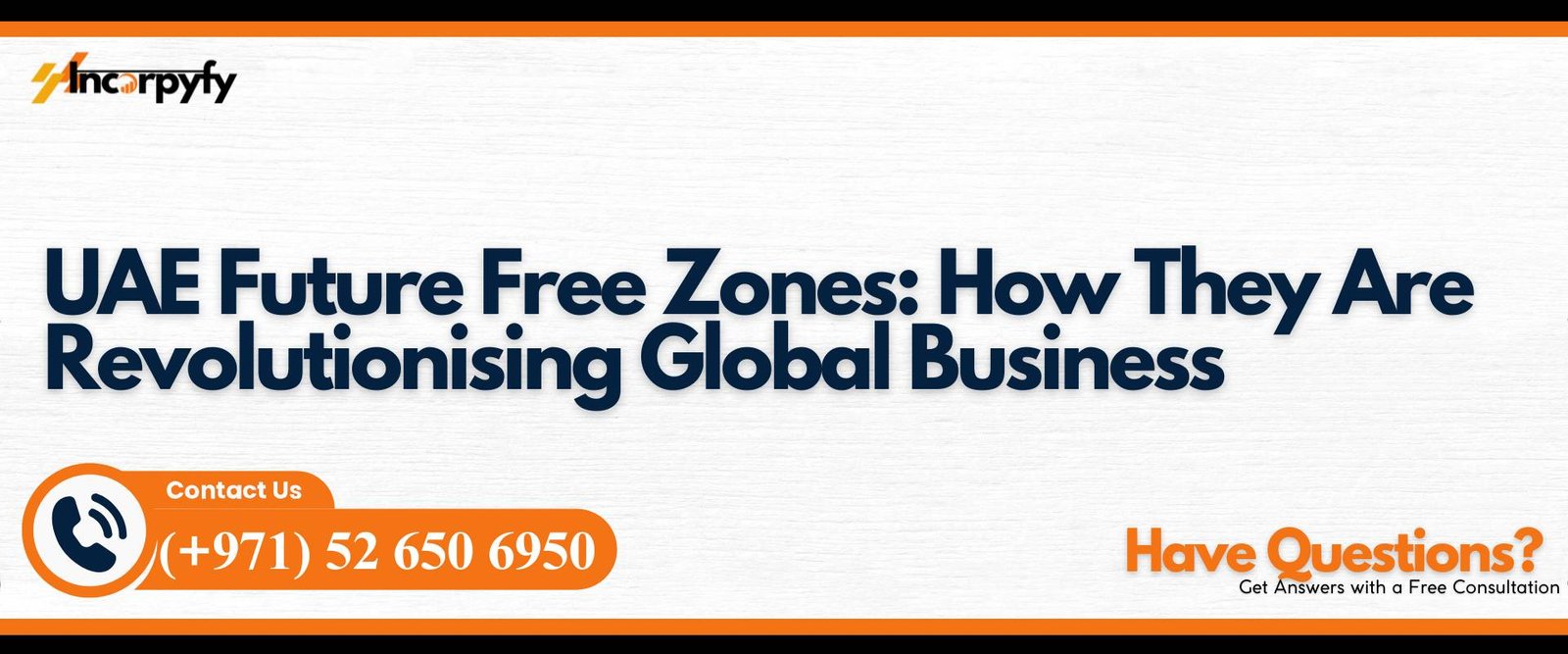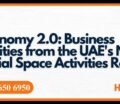
The United Arab Emirates (UAE) has emerged as a global powerhouse in business innovation, largely due to its revolutionary approach to free zone development. With more than 40 multidisciplinary free zones across the country, the UAE continues to transform the international business landscape by offering unprecedented opportunities for foreign investment, business setup, and commercial growth. These future-ready free zones are not just business districts; they are comprehensive ecosystems designed to foster innovation, facilitate global trade, and revolutionize how companies operate in the modern economy.
The UAE’s free zone strategy represents a paradigm shift in economic development, combining cutting-edge infrastructure with progressive regulations to create environments where businesses can thrive without traditional barriers. From Dubai’s specialized zones to Abu Dhabi’s financial hubs, each free zone is strategically designed to cater to specific industries while providing comprehensive support for international businesses seeking to establish their presence in the Middle East and beyond.
The Evolution of UAE Free Zones
The transformation of UAE free zones from simple trading hubs to sophisticated business ecosystems represents one of the most significant developments in modern economic policy. For businesses looking to expand or set up a new company, UAE free zones offer 100% foreign ownership, tax exemptions, and simplified company registration processes. This evolution has positioned the UAE as a preferred destination for multinational corporations, startups, and SMEs seeking strategic market entry points.
The future vision of UAE free zones encompasses advanced digital infrastructure, sustainable development practices, and industry-specific specialization. These zones are being designed with smart city technologies, green building standards, and digital transformation capabilities that align with global business trends and environmental requirements. The integration of artificial intelligence, blockchain technology, and IoT solutions within free zone operations demonstrates the UAE’s commitment to maintaining its competitive edge in the global marketplace.
Key Features of Modern UAE Free Zones
Modern UAE free zones incorporate several revolutionary features that distinguish them from traditional business districts. 100% foreign ownership remains a cornerstone benefit, allowing international investors to maintain complete control over their operations without requiring local partners. Tax advantages include exemptions from corporate taxes, personal income taxes, and import/export duties, creating significant cost savings for businesses operating within these zones.
Streamlined business setup processes have been enhanced through digital platforms and online registration systems, reducing the time required to establish operations from weeks to days. In 2024, many Free Zones offer online portals and streamlined processes, significantly reducing administrative burdens and enabling faster market entry for international businesses.
Strategic Advantages of UAE Free Zones
The strategic positioning of UAE free zones offers unparalleled access to global markets, bridging connections between Asia, Europe, Africa, and the Americas. This geographic advantage, combined with world-class infrastructure, creates optimal conditions for international trade, logistics operations, and regional business expansion.
Regulatory frameworks within UAE free zones are designed to support business growth while maintaining international compliance standards. Each zone operates under specific regulations tailored to its target industries, ensuring that businesses receive relevant support and guidance for their operations. The legal infrastructure provides certainty and protection for international investments, making the UAE an attractive destination for long-term business commitments.
Industry-Specific Specialization
Different UAE free zones specialize in specific industries, creating clusters of expertise and supporting infrastructure. Dubai’s Jebel Ali Free Zone (JAFZA) focuses on logistics and manufacturing, while Dubai Multi Commodities Centre (DMCC): A leading hub for commodities trading, especially in gold and diamonds. This specialization enables businesses to benefit from industry-specific services, supply chains, and networking opportunities.
Technology and innovation zones are emerging as key drivers of future economic growth, offering specialized infrastructure for fintech companies, AI developers, blockchain startups, and digital transformation businesses. These zones provide access to research facilities, testing environments, and collaboration spaces that support innovation and development activities.
Financial Free Zones Leading Innovation
Abu Dhabi Global Market (ADGM) represents the pinnacle of financial free zone development in the UAE. ADGM, a leading, award-winning, International Financial Centre, operates across Al Maryah Island and Al Reem Island, making it one of the largest financial districts in the world. This financial hub demonstrates how specialized free zones can create comprehensive ecosystems for specific industries.
The regulatory framework of ADGM is based on English common law, providing familiar legal structures for international financial institutions. It has been granted the status of an independent legal personality (under Article 2 of ADGM Law) and has its own civil and commercial laws primarily based on the common law and other international best practices. This legal foundation creates confidence among international investors and facilitates complex financial transactions.
Fintech and Digital Banking Revolution
Financial technology companies are finding exceptional opportunities within UAE free zones, particularly in ADGM and other fintech-focused zones. The regulatory environment supports digital banking innovations, cryptocurrency operations, blockchain applications, and artificial intelligence in financial services. These zones provide regulatory sandboxes where fintech companies can test innovative solutions under relaxed regulatory conditions.
Digital payment systems, robo-advisory services, peer-to-peer lending platforms, and insurtech solutions are thriving within these specialized environments. The combination of regulatory support, technological infrastructure, and market access creates ideal conditions for financial innovation and digital transformation.
Manufacturing and Logistics Excellence
Manufacturing free zones in the UAE are revolutionizing production and supply chain management through advanced automation, Industry 4.0 technologies, and sustainable manufacturing practices. These zones offer state-of-the-art facilities, quality certification support, and export facilitation services that enable manufacturers to serve global markets efficiently.
Logistics and warehousing facilities within free zones are equipped with smart inventory management systems, automated sorting technologies, and real-time tracking capabilities. The integration of artificial intelligence and machine learning in logistics operations optimizes supply chain efficiency and reduces operational costs for businesses operating within these zones.
Advanced Manufacturing Technologies
3D printing facilities, robotics integration, and smart manufacturing systems are becoming standard features in UAE manufacturing free zones. These technologies enable rapid prototyping, customized production, and flexible manufacturing processes that respond quickly to market demands. Quality control systems incorporating AI-powered inspection and predictive maintenance ensure high standards while minimizing downtime.
Sustainable manufacturing practices are increasingly important, with free zones incorporating renewable energy systems, waste reduction programs, and circular economy principles. These initiatives not only reduce environmental impact but also create cost savings and enhance corporate social responsibility profiles for businesses operating within these zones.
Technology and Innovation Hubs
Technology-focused free zones are emerging as catalysts for digital transformation and innovation development across the UAE. These zones provide specialized infrastructure for software development, data centers, cloud computing services, and emerging technology research. The concentration of tech companies, research institutions, and innovation labs creates synergistic environments that accelerate technological advancement.
Startup incubators and accelerator programs within technology zones provide crucial support for emerging businesses and entrepreneurial ventures. Access to mentorship programs, funding opportunities, collaborative workspaces, and networking events enables startups to scale rapidly and access international markets.
Digital Infrastructure and Smart City Integration
5G networks, fiber optic connectivity, and cloud computing infrastructure form the backbone of modern UAE free zones. These digital foundations support remote work capabilities, video conferencing facilities, data analytics platforms, and IoT implementations that enhance business operations and productivity.
Smart building systems incorporating energy management, security automation, environmental controls, and space optimization create efficient and comfortable working environments. The integration of smart city technologies enables traffic management, waste optimization, energy efficiency, and environmental monitoring that improve overall quality of life within free zone communities.
Healthcare and Life Sciences Innovation
Healthcare free zones in the UAE are revolutionizing medical services, pharmaceutical development, and medical device manufacturing. These specialized zones provide regulatory frameworks specific to healthcare industries, clinical trial facilities, research laboratories, and manufacturing capabilities that support the entire healthcare value chain.
Telemedicine platforms, digital health solutions, medical AI applications, and biotechnology research are finding exceptional support within healthcare-focused free zones. The combination of regulatory flexibility, research infrastructure, and market access creates optimal conditions for healthcare innovation and medical technology development.
Medical Tourism and Wellness Services
Medical tourism facilities within UAE free zones are attracting international patients seeking high-quality healthcare services. These facilities offer specialized treatments, wellness programs, rehabilitation services, and preventive care that cater to diverse international markets. The integration of luxury accommodations, cultural services, and tourism activities creates comprehensive medical tourism experiences.
Wellness and spa services, fitness facilities, nutrition programs, and mental health support are becoming integral components of healthcare free zones. These holistic approaches to health and wellness attract both medical professionals and health-conscious consumers from around the world.
Media and Creative Industries
Media free zones in the UAE support content creation, film production, digital media development, and creative industries. These zones provide production facilities, post-production services, broadcasting capabilities, and creative spaces that enable media companies to produce content for regional and international markets.
Digital content creation, social media marketing, influencer networks, and streaming services are finding strong support within media-focused free zones. The combination of creative talent, technological infrastructure, and distribution networks creates comprehensive ecosystems for modern media businesses.
Entertainment and Cultural Development
Entertainment venues, cultural centers, exhibition spaces, and event facilities within media free zones create vibrant communities that attract creative professionals and cultural enthusiasts. These environments foster artistic collaboration, cultural exchange, and creative innovation that contribute to the UAE’s cultural development.
Gaming companies, animation studios, virtual reality developers, and augmented reality creators are establishing operations within media free zones to take advantage of technical infrastructure, creative talent pools, and regional market access. The growing entertainment industry in the UAE provides significant opportunities for creative businesses and digital entertainment companies.
Sustainable Development and Green Initiatives
Sustainable free zones in the UAE are setting new standards for environmental responsibility and green business practices. These zones incorporate renewable energy systems, water conservation technologies, waste management solutions, and carbon reduction programs that minimize environmental impact while maintaining business efficiency.
Green building certifications, energy-efficient designs, sustainable transportation options, and environmental monitoring systems are becoming standard features in new free zone developments. These initiatives not only support environmental goals but also create cost savings and competitive advantages for businesses committed to sustainability.
Circular Economy Implementation
Circular economy principles are being integrated into free zone operations through resource recycling, waste-to-energy systems, material recovery programs, and sustainable supply chains. These approaches create economic value from waste streams while reducing environmental impact and supporting sustainable development goals.
Clean technology companies, renewable energy developers, environmental consulting firms, and sustainable manufacturing businesses are finding exceptional opportunities within green-focused free zones. The combination of environmental support, regulatory incentives, and market demand for sustainable solutions creates favorable conditions for green business development.
Future Trends and Developments
The future of UAE free zones will be shaped by emerging technologies, changing business models, global economic trends, and evolving regulatory frameworks. Artificial intelligence integration, blockchain implementations, virtual reality applications, and IoT deployments will continue to transform how free zones operate and serve their business communities.
Remote work capabilities, hybrid business models, digital nomad support, and flexible workspace solutions are becoming increasingly important as businesses adapt to changing work patterns. Free zones are evolving to support these new business models while maintaining their core advantages of regulatory benefits, tax incentives, and international market access.
Next-Generation Business Models
Platform businesses, sharing economy models, subscription services, and digital marketplaces are finding strong support within modern UAE free zones. These innovative business models require flexible regulatory frameworks, digital infrastructure, and international connectivity that free zones are uniquely positioned to provide.
Collaborative economy initiatives, co-innovation programs, cross-industry partnerships, and ecosystem development are becoming key strategies for free zone management. These approaches create synergistic relationships between businesses, knowledge sharing opportunities, and collaborative innovation that benefit all zone participants.
Conclusion
The UAE’s future free zones represent a revolutionary approach to global business development, combining innovative infrastructure, progressive regulations, and strategic positioning to create unparalleled opportunities for international businesses. These zones continue to evolve and adapt to changing global business needs, incorporating emerging technologies, sustainable practices, and industry-specific specialization that maintain their competitive advantages.
From financial services to manufacturing, technology to healthcare, UAE free zones provide comprehensive ecosystems that support business growth, innovation, and international expansion. The commitment to continuous improvement, digital transformation, and sustainable development ensures that these zones will remain at the forefront of global business development for years to come.
For businesses seeking to establish operations in these dynamic environments, partnering with experienced Freezone Business Setup in Dubai consultants can provide invaluable guidance on zone selection, regulatory compliance, and business establishment processes. The expertise and local knowledge of professional consultants can significantly accelerate the setup process and ensure optimal positioning for business success.
Frequently Asked Questions (FAQs)
What are the main advantages of setting up a business in UAE free zones?
The primary advantages include 100% foreign ownership, tax exemptions (corporate and personal income tax), simplified business setup processes, no currency restrictions, full repatriation of profits, and streamlined import/export procedures. Additionally, businesses benefit from world-class infrastructure, strategic location, and access to regional and international markets.
How many free zones are currently operating in the UAE?
The UAE currently has more than 40 specialized free zones across different emirates, each catering to specific industries and business activities. These include zones focused on logistics, financial services, technology, media, healthcare, manufacturing, and general trading.
What types of business structures can be established in UAE free zones?
Businesses can establish Free Zone Limited Liability Companies (FZ LLC) or Free Zone Companies (FZ Co.). Additionally, some zones allow branch offices of foreign companies, representative offices, and specialized licensing for specific activities such as freelance permits and professional services.
Are there any restrictions on business activities in free zones?
While free zones offer significant flexibility, certain restrictions may apply depending on the specific zone and license type. Generally, free zone companies cannot directly trade with the UAE domestic market without additional licensing. Some zones have minimum capital requirements and office space mandates that must be met.
How long does it take to set up a business in a UAE free zone?
The business setup process typically takes 3-10 working days depending on the free zone, business activity, and documentation readiness. Many zones now offer online registration platforms and fast-track services that can expedite the process further.
What are the ongoing compliance requirements for free zone businesses?
Ongoing requirements typically include annual license renewal, submission of audited financial statements, maintaining registered office address, visa compliance for employees, and adherence to zone-specific regulations. Some zones may require minimum business activity or revenue thresholds.
Can free zone companies hire international employees?
Yes, free zone companies can sponsor employment visas for international employees. The number of visas available depends on factors such as license type, office space size, business activity, and zone-specific regulations. Many zones offer flexible visa packages to accommodate different business needs.
What support services are available within UAE free zones?
Free zones typically provide comprehensive support services including business setup assistance, government relations, banking introductions, legal and accounting services, HR support, marketing assistance, and networking opportunities. Many zones also offer incubation programs and business development services for startups and growing companies.






